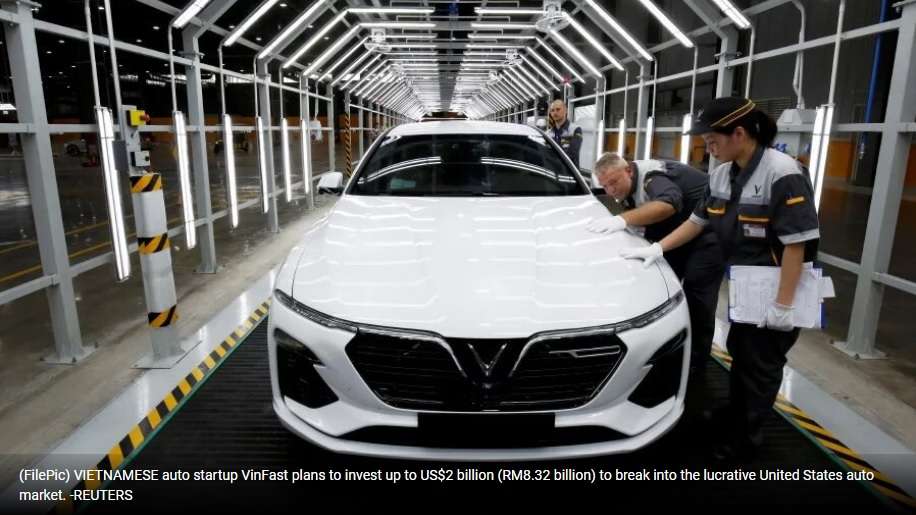
Vietnam's VinFast eyes US market
2019-12-10
VIETNAMESE auto startup VinFast plans to invest up to US$2 billion (RM8.32 billion) to break into the lucrative United States auto market.
Vietnam’s richest man and billionaire Pham Nhat Vuong, who is charge of the new automaker, is so intent on exporting electric vehicles to the US in 2021 that he’s using his own funds to achieve it.
According to Bloomberg, his cash would account for half the capital investment of VinFast, which began delivering cars to Vietnamese consumers with BMW-licensed engines earlier this year and aims to expand into electric vehicles.
“Our ultimate goal is to create an international brand,” the 51-year-old tycoon said in an interview at the Hanoi headquarters of the car company’s parent Vingroup JSC.
Vuong founded the company and holds the title of chairman.
“It will be a very difficult road and we will have to put in a lot of effort. But there’s only one road ahead.”
In Vietnam, VinFast Trading and Production LLC has formidable competition from established foreign players such as Toyota, Ford Motor Co and Hyundai.
VinFast follows a long list of Chinese automakers that have also had ambitions to sell vehicles in the US going back more than a decade. Though the plans have yet come to fruition, Guangzhou Automobile Group Co., Zotye Automobile Co. and others have set up local sales units and research and development operations to show just how serious they are.
Some Chinese brands have also exhibited at American auto shows in recent years.
However, the tycoon, whose net worth is US$9.1 billion (RM37.9 billion), according to the Bloomberg Billionaires Index, is undaunted.
Vingroup sold some shares last year and Vuong plans to sell as much as 10 per cent of his own shares to raise funds for the ambitious project.
He owns 49 per cent of VinFast, while the parent, Vingroup, holds 51 per cent.
Vuong said the automaker won’t be profitable for as many as five years as the local market is “too small” and overseas sales were the key to becoming profitable.
VinFast will also have to overcome an even more daunting task of winning over demanding consumers in the US and other developed markets, where emissions and crash standards are stringent.
Adding to these challenges is successfully manufacturing and selling electric vehicles. Many Chinese startups, backed by billions of dollars in funding, bet on the prospects for EVs in the world’s biggest auto market, but few are making money.
VinFast’s first EV won’t roll off its assembly line until late next year, but Vuong said he plans to export those vehicles to the US, Europe and Russia in 2021.
VinFast must clear several high hurdles to compete outside Vietnam, said Michael Dunne, chief executive officer of automotive consultant ZoZo Go LLC, which specializes in the Asian market.
“It will be some time before the company is ready to compete in the US -- still the world’s toughest market. You need a solid brand name,” he said.
He said many consumers preferred a second hand Honda or Toyota vehicle over a new car with an unfamiliar brand name.
Dunne said VinFast will need to produce at least 100,000 vehicles a year to be cost competitive, develop a global brand and establish a parts and services network.
VinFast, which operates a 335-hectare factory in the northern port city of Haiphong, is selling its first line of vehicles -- a hatchback, sedan and SUV -- at below cost.
The hatchback retails for the equivalent of US$17,000 (RM70,800), while the four cylinder sedan goes for US$47,400 (RM197,000) and its SUV is offered at US$60,400 (RM252,000).
The company targets production of as many as 500,000 vehicles a year by 2025. It also makes electric scooters.
Vuong said that in the next few years, Vingroup will have to spend “many trillions of dong per year” to cover losses for VinFast, estimated at as much as 18 trillion dong (RM3.2 billion) annually.
Those losses include financing and depreciation, and as much as 7 trillion dong (RM1.26 billion) each year to absorb the hit of selling cars below cost.
“We have the desire to build a Vietnamese brand that has a world class reputation. Our biggest challenge is that Vietnamese products do not have an international brand. To many international friends, Vietnam is still a poor, backward country.
“We will have to find a way to market and prove our products represent a dynamic and developing Vietnam that has reached the highest standards of the world.”
